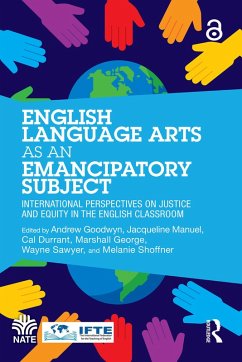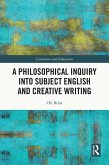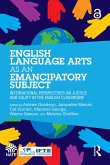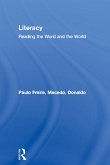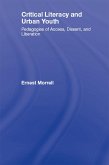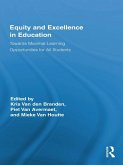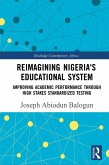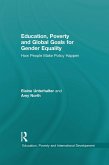English Language Arts as an Emancipatory Subject (eBook, PDF)
International Perspectives on Justice and Equity in the English Classroom
Redaktion: Goodwyn, Andrew; Shoffner, Melanie; Sawyer, Wayne; Manuel, Jacqueline; George, Marshall; Durrant, Cal
40,95 €
40,95 €
inkl. MwSt.
Sofort per Download lieferbar

20 °P sammeln
40,95 €
Als Download kaufen

40,95 €
inkl. MwSt.
Sofort per Download lieferbar

20 °P sammeln
Jetzt verschenken
Alle Infos zum eBook verschenken
40,95 €
inkl. MwSt.
Sofort per Download lieferbar
Alle Infos zum eBook verschenken

20 °P sammeln
English Language Arts as an Emancipatory Subject (eBook, PDF)
International Perspectives on Justice and Equity in the English Classroom
Redaktion: Goodwyn, Andrew; Shoffner, Melanie; Sawyer, Wayne; Manuel, Jacqueline; George, Marshall; Durrant, Cal
- Format: PDF
- Merkliste
- Auf die Merkliste
- Bewerten Bewerten
- Teilen
- Produkt teilen
- Produkterinnerung
- Produkterinnerung

Bitte loggen Sie sich zunächst in Ihr Kundenkonto ein oder registrieren Sie sich bei
bücher.de, um das eBook-Abo tolino select nutzen zu können.
Hier können Sie sich einloggen
Hier können Sie sich einloggen
Sie sind bereits eingeloggt. Klicken Sie auf 2. tolino select Abo, um fortzufahren.

Bitte loggen Sie sich zunächst in Ihr Kundenkonto ein oder registrieren Sie sich bei bücher.de, um das eBook-Abo tolino select nutzen zu können.
English Language Arts as an Emancipatory Subject explores the changing nature and history of the English Language as an emancipatory subject, as well as how its current activities and projects address and challenge inequalities.
- Geräte: PC
- mit Kopierschutz
- eBook Hilfe
- Größe: 5.82MB
Andere Kunden interessierten sich auch für
![A Philosophical Inquiry into Subject English and Creative Writing (eBook, PDF) A Philosophical Inquiry into Subject English and Creative Writing (eBook, PDF)]() Oli BelasA Philosophical Inquiry into Subject English and Creative Writing (eBook, PDF)42,95 €
Oli BelasA Philosophical Inquiry into Subject English and Creative Writing (eBook, PDF)42,95 €![English Language Arts as an Emancipatory Subject (eBook, ePUB) English Language Arts as an Emancipatory Subject (eBook, ePUB)]() English Language Arts as an Emancipatory Subject (eBook, ePUB)40,95 €
English Language Arts as an Emancipatory Subject (eBook, ePUB)40,95 €![Literacy (eBook, PDF) Literacy (eBook, PDF)]() Paulo FreireLiteracy (eBook, PDF)47,95 €
Paulo FreireLiteracy (eBook, PDF)47,95 €![Critical Literacy and Urban Youth (eBook, PDF) Critical Literacy and Urban Youth (eBook, PDF)]() Ernest MorrellCritical Literacy and Urban Youth (eBook, PDF)55,95 €
Ernest MorrellCritical Literacy and Urban Youth (eBook, PDF)55,95 €![Equity and Excellence in Education (eBook, PDF) Equity and Excellence in Education (eBook, PDF)]() Equity and Excellence in Education (eBook, PDF)54,95 €
Equity and Excellence in Education (eBook, PDF)54,95 €![Reimagining Nigeria's Educational System (eBook, PDF) Reimagining Nigeria's Educational System (eBook, PDF)]() Joseph A. BalogunReimagining Nigeria's Educational System (eBook, PDF)42,95 €
Joseph A. BalogunReimagining Nigeria's Educational System (eBook, PDF)42,95 €![Education, Poverty and Global Goals for Gender Equality (eBook, PDF) Education, Poverty and Global Goals for Gender Equality (eBook, PDF)]() Elaine UnterhalterEducation, Poverty and Global Goals for Gender Equality (eBook, PDF)46,95 €
Elaine UnterhalterEducation, Poverty and Global Goals for Gender Equality (eBook, PDF)46,95 €-
-
-
English Language Arts as an Emancipatory Subject explores the changing nature and history of the English Language as an emancipatory subject, as well as how its current activities and projects address and challenge inequalities.
Dieser Download kann aus rechtlichen Gründen nur mit Rechnungsadresse in A, B, BG, CY, CZ, D, DK, EW, E, FIN, F, GR, HR, H, IRL, I, LT, L, LR, M, NL, PL, P, R, S, SLO, SK ausgeliefert werden.
Produktdetails
- Produktdetails
- Verlag: Taylor & Francis eBooks
- Seitenzahl: 352
- Erscheinungstermin: 24. Dezember 2024
- Englisch
- ISBN-13: 9781040255780
- Artikelnr.: 72279676
- Verlag: Taylor & Francis eBooks
- Seitenzahl: 352
- Erscheinungstermin: 24. Dezember 2024
- Englisch
- ISBN-13: 9781040255780
- Artikelnr.: 72279676
- Herstellerkennzeichnung Die Herstellerinformationen sind derzeit nicht verfügbar.
Andrew Goodwyn is President of the International Federation for the Teaching of English and a Fellow of the Royal Society of the Arts. He is also Emeritus Professor, The University of Reading, UK. Jacqueline Manuel is Professor of English Education, Sydney School of Education and Social Work, University of Sydney, Australia. Cal Durrant is retired Associate Professor in English Curriculum and Director of the Literacy Research Hub, Australian Catholic University, Australia. Wayne Sawyer is Emeritus Professor, School of Education, Western Sydney University, Australia. Marshall George is Olshan Professor of Clinical Practice, Hunter College, City University of New York, USA. Melanie Shoffner is Professor of English Education, James Madison University, USA.
Part I: Establishing English as an Emancipatory Subject
1. Knowing the Subject, Knowing its History: Examining Key Figures in
English who Contributed to its Emancipatory Nature
2. English as an Emancipatory Subject in England: A Historical Perspective,
1875-2024
3. English Teaching for Democratic Futures: The Role of Language, Literacy
and Literature in Developing Creative and Critical Thinkers
4. The English Language Emerging as an Identity for Migrants and Refugees
5. Describing the World with Our Students in it: ELA and the Power of
'Recognition'
Part II: Reconfiguring the Curriculum of Emancipatory English
6. Teaching English to Nurture Social Imagination in the Early Years of
Schooling: Emancipation versus Constraints
7. English, Literature and Questions of Emancipation: What does Literature
Offer?
8. Equality, Diversity and Inclusion through Children's Literature in
Higher Education
9. Making English Good and Right: Curriculum Reform in Aotearoa New Zealand
10. The Power of English Within and For the Lives of Migrant and Refugee
Students
11. Rurality, Writing and English: Spatial Justice for Rural Students
through English Teaching and Writing Pedagogy
12. Transitioning from Critical Literacy to the Ecocritical
Part III: Emancipatory English in Practice
13. Cultivating Critical Thinking Through Canonical and Non-Canonical
Texts: Using a Social Justice Framework to Shape Curriculum and Instruction
14. Applying Country-Centred Place Pedagogies to Include All Learners in
English
15. The Dignity of Choice: Independent Reading's Emancipatory Potential as
an Instructional Practice
16. Ungrading for Social Justice: De-Centering Grades, Inequity, and White
Supremacy
17. Recovering Truth-Seeking Ethical Pedagogies for the Literature
Classroom in a Post-Truth Age
18. Shaping Identities: How Marginalized Students Harness Discourse to
Reclaim Power in English Language Arts
19. "I Make it What I Want": Cultivating Fugitive Spaces of Acceptance and
Resistance for Minoritized Students in the ELA Classroom
Part IV: Teachers of Emancipatory English
20. Possibilities and Practicalities: English Teachers and Their Creation
of Spaces for Students' Voices and Agency
21. U.S. Teachers, Book Bans, and Sustaining the Self in the Southern
Discourse
22. From Teacher to Teacher Educator: Developing an Anti-Racist,
Anti-Biased Stance
Kristen Hawley Turner
23. Reflection and Liberation: The Reimagination of an English Methods
Course
Madison Gannon and Jennifer Ervin
1. Knowing the Subject, Knowing its History: Examining Key Figures in
English who Contributed to its Emancipatory Nature
2. English as an Emancipatory Subject in England: A Historical Perspective,
1875-2024
3. English Teaching for Democratic Futures: The Role of Language, Literacy
and Literature in Developing Creative and Critical Thinkers
4. The English Language Emerging as an Identity for Migrants and Refugees
5. Describing the World with Our Students in it: ELA and the Power of
'Recognition'
Part II: Reconfiguring the Curriculum of Emancipatory English
6. Teaching English to Nurture Social Imagination in the Early Years of
Schooling: Emancipation versus Constraints
7. English, Literature and Questions of Emancipation: What does Literature
Offer?
8. Equality, Diversity and Inclusion through Children's Literature in
Higher Education
9. Making English Good and Right: Curriculum Reform in Aotearoa New Zealand
10. The Power of English Within and For the Lives of Migrant and Refugee
Students
11. Rurality, Writing and English: Spatial Justice for Rural Students
through English Teaching and Writing Pedagogy
12. Transitioning from Critical Literacy to the Ecocritical
Part III: Emancipatory English in Practice
13. Cultivating Critical Thinking Through Canonical and Non-Canonical
Texts: Using a Social Justice Framework to Shape Curriculum and Instruction
14. Applying Country-Centred Place Pedagogies to Include All Learners in
English
15. The Dignity of Choice: Independent Reading's Emancipatory Potential as
an Instructional Practice
16. Ungrading for Social Justice: De-Centering Grades, Inequity, and White
Supremacy
17. Recovering Truth-Seeking Ethical Pedagogies for the Literature
Classroom in a Post-Truth Age
18. Shaping Identities: How Marginalized Students Harness Discourse to
Reclaim Power in English Language Arts
19. "I Make it What I Want": Cultivating Fugitive Spaces of Acceptance and
Resistance for Minoritized Students in the ELA Classroom
Part IV: Teachers of Emancipatory English
20. Possibilities and Practicalities: English Teachers and Their Creation
of Spaces for Students' Voices and Agency
21. U.S. Teachers, Book Bans, and Sustaining the Self in the Southern
Discourse
22. From Teacher to Teacher Educator: Developing an Anti-Racist,
Anti-Biased Stance
Kristen Hawley Turner
23. Reflection and Liberation: The Reimagination of an English Methods
Course
Madison Gannon and Jennifer Ervin
Part I: Establishing English as an Emancipatory Subject
1. Knowing the Subject, Knowing its History: Examining Key Figures in
English who Contributed to its Emancipatory Nature
2. English as an Emancipatory Subject in England: A Historical Perspective,
1875-2024
3. English Teaching for Democratic Futures: The Role of Language, Literacy
and Literature in Developing Creative and Critical Thinkers
4. The English Language Emerging as an Identity for Migrants and Refugees
5. Describing the World with Our Students in it: ELA and the Power of
'Recognition'
Part II: Reconfiguring the Curriculum of Emancipatory English
6. Teaching English to Nurture Social Imagination in the Early Years of
Schooling: Emancipation versus Constraints
7. English, Literature and Questions of Emancipation: What does Literature
Offer?
8. Equality, Diversity and Inclusion through Children's Literature in
Higher Education
9. Making English Good and Right: Curriculum Reform in Aotearoa New Zealand
10. The Power of English Within and For the Lives of Migrant and Refugee
Students
11. Rurality, Writing and English: Spatial Justice for Rural Students
through English Teaching and Writing Pedagogy
12. Transitioning from Critical Literacy to the Ecocritical
Part III: Emancipatory English in Practice
13. Cultivating Critical Thinking Through Canonical and Non-Canonical
Texts: Using a Social Justice Framework to Shape Curriculum and Instruction
14. Applying Country-Centred Place Pedagogies to Include All Learners in
English
15. The Dignity of Choice: Independent Reading's Emancipatory Potential as
an Instructional Practice
16. Ungrading for Social Justice: De-Centering Grades, Inequity, and White
Supremacy
17. Recovering Truth-Seeking Ethical Pedagogies for the Literature
Classroom in a Post-Truth Age
18. Shaping Identities: How Marginalized Students Harness Discourse to
Reclaim Power in English Language Arts
19. "I Make it What I Want": Cultivating Fugitive Spaces of Acceptance and
Resistance for Minoritized Students in the ELA Classroom
Part IV: Teachers of Emancipatory English
20. Possibilities and Practicalities: English Teachers and Their Creation
of Spaces for Students' Voices and Agency
21. U.S. Teachers, Book Bans, and Sustaining the Self in the Southern
Discourse
22. From Teacher to Teacher Educator: Developing an Anti-Racist,
Anti-Biased Stance
Kristen Hawley Turner
23. Reflection and Liberation: The Reimagination of an English Methods
Course
Madison Gannon and Jennifer Ervin
1. Knowing the Subject, Knowing its History: Examining Key Figures in
English who Contributed to its Emancipatory Nature
2. English as an Emancipatory Subject in England: A Historical Perspective,
1875-2024
3. English Teaching for Democratic Futures: The Role of Language, Literacy
and Literature in Developing Creative and Critical Thinkers
4. The English Language Emerging as an Identity for Migrants and Refugees
5. Describing the World with Our Students in it: ELA and the Power of
'Recognition'
Part II: Reconfiguring the Curriculum of Emancipatory English
6. Teaching English to Nurture Social Imagination in the Early Years of
Schooling: Emancipation versus Constraints
7. English, Literature and Questions of Emancipation: What does Literature
Offer?
8. Equality, Diversity and Inclusion through Children's Literature in
Higher Education
9. Making English Good and Right: Curriculum Reform in Aotearoa New Zealand
10. The Power of English Within and For the Lives of Migrant and Refugee
Students
11. Rurality, Writing and English: Spatial Justice for Rural Students
through English Teaching and Writing Pedagogy
12. Transitioning from Critical Literacy to the Ecocritical
Part III: Emancipatory English in Practice
13. Cultivating Critical Thinking Through Canonical and Non-Canonical
Texts: Using a Social Justice Framework to Shape Curriculum and Instruction
14. Applying Country-Centred Place Pedagogies to Include All Learners in
English
15. The Dignity of Choice: Independent Reading's Emancipatory Potential as
an Instructional Practice
16. Ungrading for Social Justice: De-Centering Grades, Inequity, and White
Supremacy
17. Recovering Truth-Seeking Ethical Pedagogies for the Literature
Classroom in a Post-Truth Age
18. Shaping Identities: How Marginalized Students Harness Discourse to
Reclaim Power in English Language Arts
19. "I Make it What I Want": Cultivating Fugitive Spaces of Acceptance and
Resistance for Minoritized Students in the ELA Classroom
Part IV: Teachers of Emancipatory English
20. Possibilities and Practicalities: English Teachers and Their Creation
of Spaces for Students' Voices and Agency
21. U.S. Teachers, Book Bans, and Sustaining the Self in the Southern
Discourse
22. From Teacher to Teacher Educator: Developing an Anti-Racist,
Anti-Biased Stance
Kristen Hawley Turner
23. Reflection and Liberation: The Reimagination of an English Methods
Course
Madison Gannon and Jennifer Ervin
